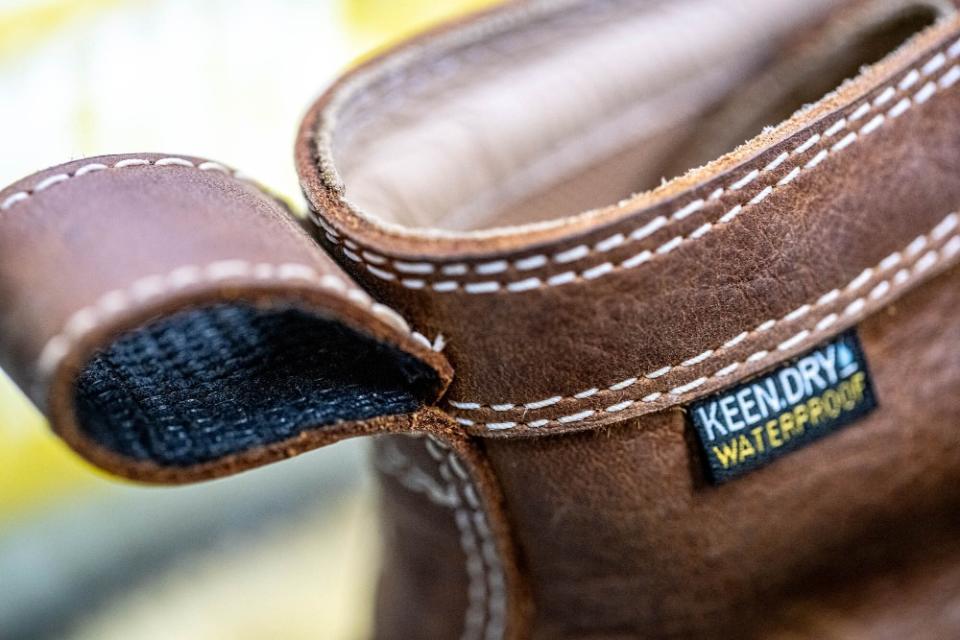Keen Provides a Roadmap to Eliminating PFAS

Keen Footwear began its journey to eliminate PFAS in 2014, long before the “forever chemicals” came under fire from legislators and concerned consumers. Now the Portland, Ore. brand is sharing its learnings, offering up a roadmap to other brands to do the same.
The shoe brand has released an update to a 2020 report detailing its Detox Initiative—a movement to eradicate the most toxic chemicals found in its supply chain. The effort, which began nine years ago, led the brand to axe per- and polyfluoroalkyl substances, or PFAS, from its lines. The family of chemicals are commonly found in durable water-repellant coatings (DWR), which keep shoes and clothing safe from the elements. “It took us four years to phase out PFAS from our footwear manufacturing process, and we continue to work to keep them out,” Keen said.
More from Sourcing Journal
Three years since its first report was released, the landscape has shifted dramatically. Federal and local government policies banning PFAS are under consideration across the country, with California and New York having passed laws to outlaw the substances in consumer products over the coming years. Shoppers have caught wind of the compounds’ potential impacts to human health and the environment, and lawsuits are on the rise, with a number of plaintiffs claiming health issues due to PFAS exposure. Industry insiders and retailers are also taking a stand; REI will ban PFAS from all textile products by 2026.

PFAS chemistry was widely commercialized during the 1940s and ‘50s, and was commonly used to provide a non-stick surface for cookware. Over the ensuing decades, footwear and outerwear developers began incorporating chemical coatings into product designs. “Back in the day, no one really understood the health effects—it was it was just about creating products to allow people to do what they wanted to do outside,” Kirsten Blackburn, director of The Keen Effect, the company’s corporate social responsibility arm, told Sourcing Journal.
The chemicals’ efficacy in keeping water off of a wearer’s skin, or dirt from sticking to a pair of shoes, led to a period of liberal, near-indiscriminate use that has persisted until very recently. In the outdoor industry, “over-engineering” has become the status quo, Blackburn said. “It became industry standard to wash everything in DWR that contain PFAS.”
As a family-owned, privately held business, 20-year-old Keen joined the sector with a fresh perspective, and dousing products in performance-enhancing chemicals was not an ingrained behavior, Blackburn said. Still, it took about a decade for the ills of PFAS to become a part of the brand’s discourse, and it consulted with environmental experts at the Green Science Policy Institute, like biophysical chemist, author and mountaineer Arlene Blum PhD. to understand the risks.
The company also conducted extensive testing on its footwear, and found PFAS present across numerous inputs. “There are hundreds of components to a shoe—the bill of materials is very long,” Blackburn said. Traces of the chemicals were found not only in the shoes’ textile uppers, but on laces and eyelets, too. “We realized it was everywhere.”
Keen decided to employ the precautionary principle, a commonly cited approach to sustainability and public safety, which emphasizes that businesses and other entities should tread lightly when it comes to adopting technologies and innovations that could cause harm to people or planet. Keen was able to eliminate PFAS across 65 percent of its line immediately, simply by deciding that certain products, like sandals, didn’t need to be waterproof. It hired a full-time chemist who spent 10,000 hours researching PFAS-free alternatives for the remaining products in its line and helped the company develop a chemical management policy and restricted substances list to share with its suppliers. Keen has open-sourced both documents in its report, hoping other brands will use them as a guide.

Today, the company’s component suppliers basically know the drill, Blackburn said. Companies like Keen have pushed them toward removing PFAS from their products, and they can see the writing on the wall. Meanwhile, the brand continues to engage in randomized product testing. “It’s very easy to add PFAS and other sorts of chemicals that we restrict after components been shipped to a manufacturing facility,” she explained. “We do random finished goods testing to ensure that nothing was added for any reason.” The journey toward PFAS-free is ongoing; in 2021, the group discovered that shipping receipts affixed to product packaging contained the substance, which prevented the ink from smudging during transport.
Keen now relies on two PFAS-free solutions to promote water repellency where needed—a solution from 3M made with hydrocarbon resins, and Rudolph Chemie’s “EcoPlus, made from a plant-based dendritic compound. Blackburn said swapping out the compounds was “pretty dang easy,” as both solutions are readily available on the chemicals market and offer the same performance benefits.
“First you have to create a policy and socialize amongst your suppliers that this is the way you’re doing business, and then you provide the alternative and it’s like turning on a switch,” she said. But keeping harmful chemicals out of the supply chain requires constant vigilance. “That’s where the rubber meets the road,” she added.

